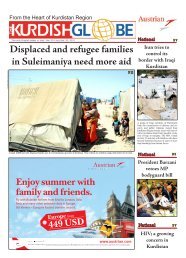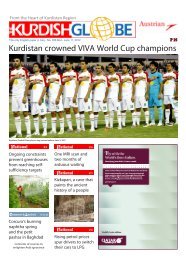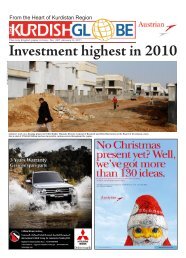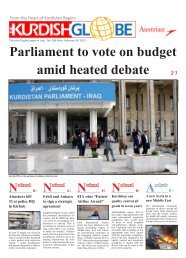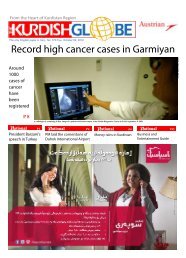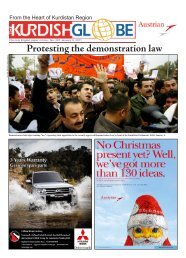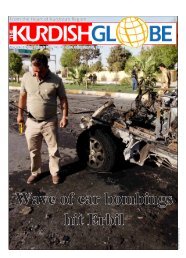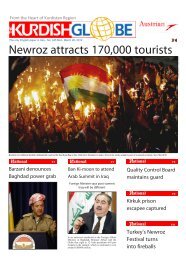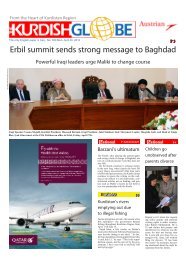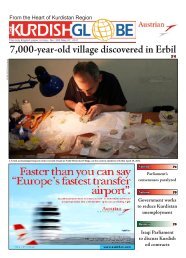Kurdish-Turkish ties stronger than ever - Kurdish Globe
Kurdish-Turkish ties stronger than ever - Kurdish Globe
Kurdish-Turkish ties stronger than ever - Kurdish Globe
You also want an ePaper? Increase the reach of your titles
YUMPU automatically turns print PDFs into web optimized ePapers that Google loves.
The <strong>Kurdish</strong> <strong>Globe</strong> No. 349, Monday, April 23, 2012 10Yezidis celebrate New YearRed Wednesday,the first Wednesdayof April accordingto the Yezidi calendidar, is celebratedby 100,000 Yezidisin Kurdistan, more<strong>than</strong> half a millilion in Iraq andmore <strong>than</strong> 1 millionworldwide.Thousands of Yezidis gathered in their main temple in Lalishto celebrate their New Year on April 18thPRESS PHOTOThe day before New Year,young Yezidi boys andgirls collect red flowersfrom the mountains andhang them on the doors oftheir homes. They painteggs in vibrant colors anddistribute them as a symbubol of existence--Yezidisbelieve that their NewYear marks the beginnuning of the existence ofhumanity. At New Year,Yezidis commonly bakespecial bread to distributeto neighbors and familulies.The Director General ofYezidi Issues in the Kurdiuistan Regional Governmument’s Ministry of Endudowment and ReligiousAffairs, Khairi Bozani,explains that in cooperatution with the council ofthe Yezidi holy men, theyYezidi Kurds celebrate their New Year in Lalish, Duhok Province.have requested that fourof their religious days berecognized. Their NewYear was approved as anofficial holiday this year,which marks the secondyear Yezidis celebratethis day in peace.Khairi says they are alsotrying get their holidaysrecognized as official inIraq through their represusentatives in Baghdad,but he is not sure this canbe achieved.The U.S. Departmentof State publishes annualreports about religiousissues in different countutries and regions aroundthe world. Last year theypublished a report aboutKurdistan in which theydidn’t find proof of violulations or oppression byauthori<strong>ties</strong> regarding religugious minori<strong>ties</strong>. In fact,they praised the region.“One of the beautiful aspupects of Kurdistan Regionis the peaceful coexistutence of its various compuponents,” says Ali Karim,Chairman of the Kurdiuish Institute for HumanRights. “This has beenone of the secrets behindthe success of Kurdistanwhen it was fighting forsurvival.”Karim argues that Yezidudis are <strong>Kurdish</strong> in originand hence should haveequal rights in all aspectsof life, including politicalrepresentation and partuticipation in governmentposts.Scania: Confederation of Swedish Enterprise anddevelopment organizations work together to rebuild IraqSweden’s Minister forTrade, Ewa Björling andministers of the Kurdistutan Regional Governmentinaugurated the SwedishTransport Academy in Erbubil, Kurdistan Region, lastweek.The training is targeted atyoung unemployed Iraqiswith a secondary schoolbackground and offers occucupational skills demandedin the transport sector. Theestablishment of the schoolis the result of close coopeueration between Scania,the Swedish InternationalDevelopment CooperationAgency (Sida), the UnitedNations, EF EducationFirst and the <strong>Kurdish</strong> Regugional Government’s Miniuistry of Labour and SocialAffairs.The Swedish Transpuport Academy opened inearly April, when almostone hundred young Iraqiscommenced their trainingin three different courses– information technolouogy (IT), English and basusic mechanics. Later thisyear, the Academy plans toexpand its activi<strong>ties</strong> to incuclude courses in advancedmechanics, driver trainingand also in sales and markuketing.“The school will serve asan important base for recucruitment of the employeesneeded for the continuedexpansion of our serviceand sales units in the countutry,” says Gustaf Sundell,who is Scania’s CountryManager for Iraq.The establishment of theSwedish Transport Acadeuemy was made possiblethrough financial assistancefrom Sida, which is investiuing SEK 20 million over afour-year period. The operauations are supervised by theUN’s development organunization UNIDO togetherwith the <strong>Kurdish</strong> RegionalGovernment’s Ministry ofLabor and Social Affairs,which is also providingpremises and paying partof the personnel costs. Scanunia is contributing certifiedteachers and equipment forthe training of service technunicians, while EF Educatution First will be providingfree access to their onlineEnglish language school.“Sida’s task is to help reduduce poverty in our partnercountries. Creating jobsand sought-after skills istremendously importantfor stability and growthin conflict-stricken countutries. It is gratifying thatwe have found a way forSwedish development assusistance and companies tocollaborate where we havecommon interests – it willoffer so much more develouopment for money,” saysHenrik Riby, Coordinator,Business for Developmentat Sida.“This investment in trainiuing is a good model for coouoperation between businessand the public sector whichshould be interesting formore Swedish companies.Scania is already conductiuing discussions with Sidaand UNIDO about theprospect of similar coopeueration in other developingcountries,” concludes Gustutaf Sundell.Scania is one of theworld’s leading manufactuturers of trucks and busesfor heavy transport applicatutions, and of industrial andmarine engines. Servicerelatedproducts accountfor a growing proportion ofthe company’s operations,assuring Scania customersof cost-effective transportsolutions and maximumuptime. Scania also offersfinancial services. Employiuing some 37,500 people, thecompany operates in about100 countries. Researchand development activi<strong>ties</strong>are concentrated in Sweduden, while production takesplace in Europe and SouthAmerica, with facili<strong>ties</strong> forglobal interchange of bothcomponents and completevehicles. In 2011, net salestotaled SEK 87.7 billionand net income amountedto SEK 9.4 billion.KRP



